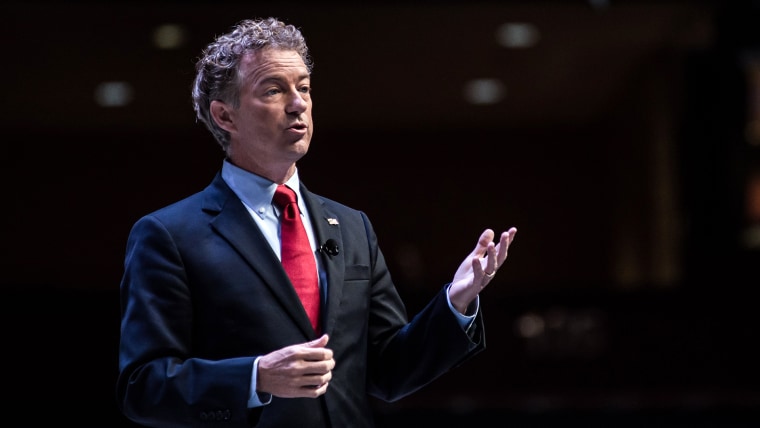The arithmetic for health care advocates is pretty simple: sometime over the next 12 days, Senate Republicans are yet again going to try to pass an overhaul of the American health care system. If three or more GOP senators break ranks, the bill will fail. If not, it'll pass and probably become law.
Sen. Rand Paul (R-Ky.) keeps insisting he's one of the three "no" votes, but no one's sure whether to believe him.
The Kentucky senator first announced his opposition to the plan eight days ago, though many assumed he was just posturing. The Republican started putting his position in writing, and still, few believed he was sincere. Rand Paul went on Fox News to explain that he really does oppose the Graham-Cassidy plan, and again, much of the political world thought he didn't mean it.
So yesterday afternoon, the Kentucky Republican hosted a press briefing of sorts in order to say he's quite serious about his rejection of the legislation. Vox explained:
On Monday, Sen. Rand Paul (R-KY) voiced clear and staunch opposition to the Cassidy-Graham-Heller-Johnson proposal -- the last remaining Obamacare repeal plan that would block-grant Obamacare funding, cap federal health care spending, and send the money to the states to come up with their own health care programs."It keeps 90 percent of Obamacare and redistributes the proceeds," Paul said in a meeting with reporters in his office Monday. He continued: "I don't think anybody has realized the enormity of this. Obamacare took a long time to get in place. It took them a year to get their website. Can you imagine now every state has got to go through this? Start completely over with all the subsidies. Some states might want subsidies, some won't, some states might go to single-payer. I think it will be a chaotic nature for two years. It's not repeal. It's another incarnation of Republican replace. But not repeal."
Asked yesterday if anything could change his mind about the Graham-Cassidy bill, Paul replied, "Not on this bill."
And yet, even as I type this, there's a part of me that finds it hard to believe he'll follow through and keep his word. To be sure, Paul would look ridiculous if he reversed course on the bill after going out of his way to flaunt his opposition, but that doesn't mean it won't happen.
Part of the trouble is, in late July, the Kentucky senator raised all kinds of concerns about his party's repeal plans before eventually voting for the final GOP plan anyway*. Since this is still fresh in everyone's mind, it's driving the skepticism about his rhetoric now.
But in fairness to Rand Paul, the circumstances are a bit different now. When he voted for the final Republican bill, for example, every Senate Republican was told it was effectively a placeholder for some future bill that was going to be negotiated in a conference committee. When Paul voted for it, he was moving the process forward, hoping there was still a chance it'd produce a bill more to his liking.
The current fight is qualitatively different. Senators aren't being asked to move the process forward; they're being asked to pass this bill and make it law. Graham-Cassidy isn't a placeholder for some future proposal; this is the final proposal.
With all of this in mind, it's at least possible that Rand Paul is telling the truth about his intentions. It's not a certainty by any means, but it's possible.
And if he does follow through -- again, "if" -- that creates a challenge for GOP leaders. Sens. Susan Collins (R-Maine), Lisa Murkowski (R-Alaska), and John McCain (R-Ariz.) -- each of whom voted against the last iteration of the repeal crusade -- appear to be on the fence, leaving Republicans in a difficult position: can the party convince two of those three to support the current plan?
* Correction: Rand Paul voted for the final Republican repeal bill, but opposed Mitch McConnell's original BCRA plan. The above text has been corrected.
